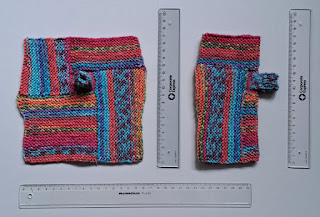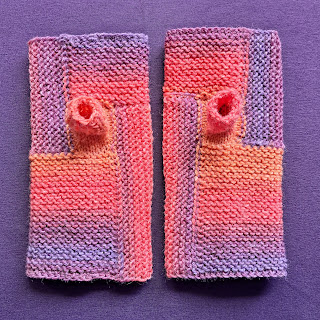The inspiration for these mitts comes from a quilt pattern I saw on social media. I asked myself whether it would be possible to arrange similar panels around the thumb to created a pair of fingerless gloves. After a few tries, it worked. In fact, you could actually view it as one big entrelac piece around a thumb.
The name of quilt pattern that first inspired me is Rail Fence. However, the similarity is only visible if you look at the an unseamed mitt laid out flat. Because of the changes in knitting direction, this is a great way to showcase your self-striping yarn.
This knitting pattern is available via
The pattern PDF is 14 pages long and contains
- written row-by-row instructions for knitting this piece in one size only – including 15 in-process photos
- an explanation (plus schematic) of the construction, and explanations how to make them bigger or smaller
- short photo tutorials for the following techniques
- crochet CO (at the edge of a knitted piece)
- kbf – knit through back and front of a stitch, a stitch that is symmetrical to a kfb
- short rows with wrap and turn and picking up the wraps
- pick up and knit, pick up and purl
- pick up and connect, i.e. picking up a stitch and connecting it in a 90 degree angle to your knitting
The finished piece measures 17 cm in height and about 17 cm in circumference (top and bottom and about a cm more at its widest point. The picture on the right shows one finished mitt and one just before sewing up the side seams.
As to gauge, in garter stitch 12 stitches gave 5 cm in width, and 12 ridges (24 rows) 5 cm in height – this was measured on an unblocked piece.
To knit these mitts you need the following materials:
- 130 meters of fingering weight yarn weight yarn - I used self-striping:
- for the ones in the title picture I used Zwerger Opal Rainforest, Colorway 9902
- the pair on the pictures below was knitted with Zwerger Opal Blütenpracht, Colorway 54, Mohn Poppy
- 3 mm knitting needles – I used 80 cm circulars as main needles
- two additional 3mm knitting needles – I used dpns
- a crochet hook that is a bit bigger than the knitting needles (I used a 4 mm hook)
- a tapestry needle – for grafting and to weave in ends





Keine Kommentare:
Kommentar veröffentlichen